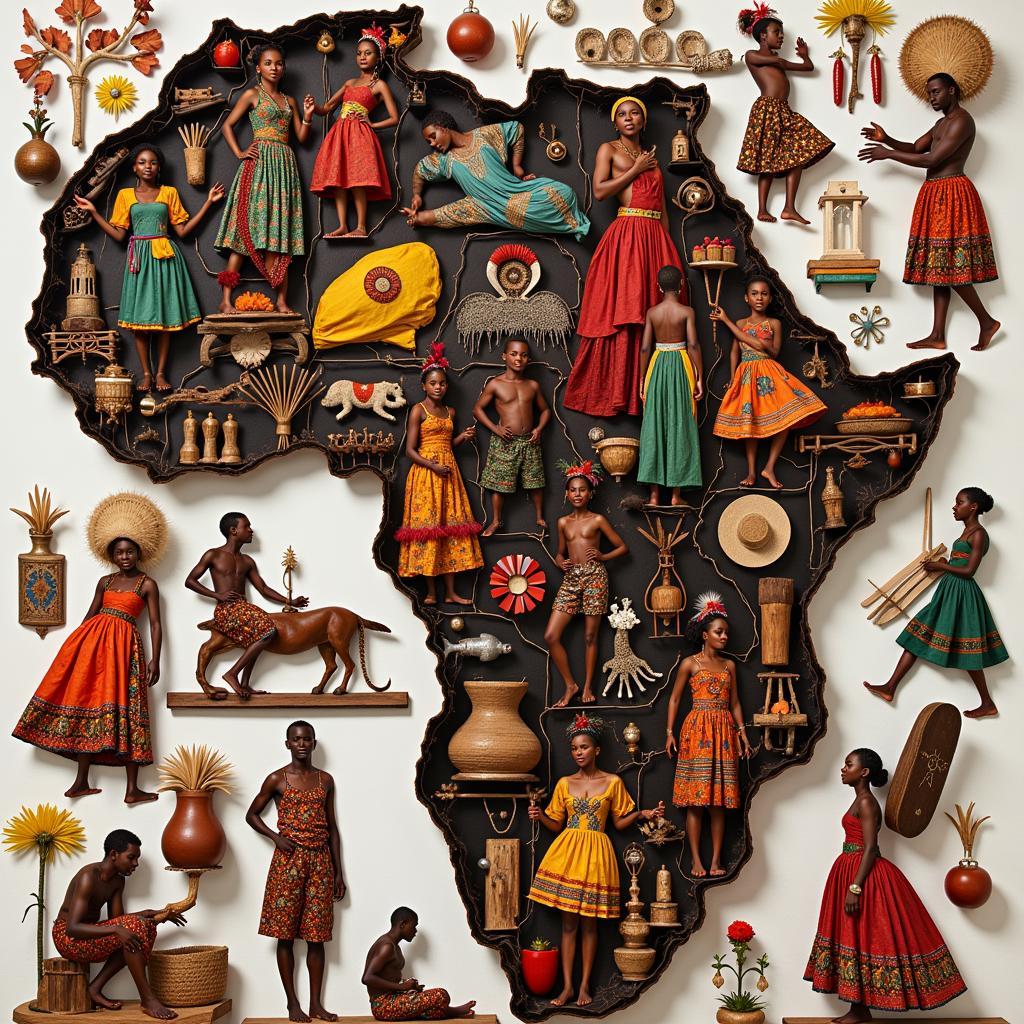Unraveling the Symbolism of the African Comb
The African comb is more than just a hair care tool; it’s a powerful symbol deeply embedded in the rich tapestry of African culture. From ancient rituals to modern fashion, the African comb holds a multifaceted meaning, representing status, identity, and a connection to ancestry. It’s a story etched in wood and bone, passed down through generations. Let’s delve into the fascinating world of the African comb and uncover its hidden meanings.
The African Comb: A History Woven Through Time
The history of the African comb can be traced back centuries, with archaeological discoveries revealing combs made from bone, ivory, and wood. These combs weren’t simply utilitarian objects; their intricate carvings and elaborate designs spoke volumes about their social and cultural significance. They were symbols of wealth, status, and even spiritual power. In many African societies, the comb was a prized possession, often passed down as a family heirloom, carrying with it the weight of tradition and ancestral wisdom. These ancient combs serve as a testament to the enduring importance of this seemingly simple object in African Life. Shortly after this, you might find the information on the African kabila dance helpful. african kabila dance
What Does the African Comb Symbolize?
The symbolism of the African comb varies across different cultures and regions of Africa. However, some common themes emerge. Often, the comb represents beauty and adornment, reflecting the importance placed on grooming and personal appearance. It can also symbolize community and belonging, as combs were frequently used in communal hairdressing rituals, strengthening social bonds. Moreover, the comb can be a symbol of fertility and prosperity, linked to the growth and abundance of hair. In some cultures, the comb is even seen as a protective talisman, warding off evil spirits.
The Comb’s Role in Rituals and Ceremonies
In many African traditions, the African comb plays a vital role in various rituals and ceremonies. From birth to marriage and even death, the comb accompanies individuals through life’s significant milestones. For example, in some cultures, a newborn baby is given a comb to ensure a healthy and prosperous life. In others, the comb is an essential part of wedding ceremonies, symbolizing the union of two families. The comb’s presence in these important rituals highlights its profound cultural meaning.
African Combs in Modern Society
Even in modern times, the African comb retains its cultural significance. It continues to be a symbol of pride and identity for many Africans, both on the continent and in the diaspora. Contemporary artists and designers are also embracing the African comb, incorporating it into their work and reimagining its traditional forms. From jewelry to fashion accessories, the African comb is finding new expressions, ensuring its legacy lives on. The continued use and evolution of the African comb demonstrates its enduring power as a cultural symbol. You can find more about African culture in this article about African comb. african comb
The African Comb as a Fashion Statement
Today, the African comb has become a powerful fashion statement, allowing individuals to express their cultural heritage and connect with their roots. Wearing an African comb as a hair accessory or incorporating it into jewelry designs is a way of celebrating African identity and showcasing its beauty to the world. This resurgence in popularity highlights the enduring appeal of this ancient symbol. For example, you might find information regarding African chimpanzee adarsh interesting. african chimpanzee adarsh
Conclusion
The African comb is far more than a utilitarian object; it is a potent symbol deeply interwoven with the cultural fabric of Africa. From its ancient origins to its modern interpretations, the African comb speaks volumes about identity, beauty, and a connection to ancestry. It is a symbol that continues to resonate with people across generations, embodying the rich and diverse heritage of Africa. What does the African Comb Symbolize? It symbolizes heritage, beauty, and connection to the past. Why is the African comb important? It is important because it represents a tangible link to African history and culture.
FAQ
-
What are African combs made of? Traditional African combs are made from materials like wood, bone, ivory, and metal.
-
How old are African combs? Archaeological evidence suggests that African combs have been in use for centuries.
-
Are African combs still used today? Yes, African combs are still widely used today, both for practical purposes and as cultural symbols.
-
What is the significance of the African comb in different cultures? The symbolism of the African comb varies across different African cultures, representing beauty, status, community, and spiritual power.
-
Where can I buy an authentic African comb? Authentic African combs can be purchased from various online retailers, craft markets, and cultural centers specializing in African art and artifacts.
-
What is the connection between the African comb and hair? The African comb is intrinsically linked to hair care and grooming, representing beauty, health, and cultural identity.
-
How can I learn more about the history of the African comb? You can learn more by researching African art, history, and cultural traditions. Museums and online resources can also provide valuable information. You can also find information related to African elephant endangered information. african elephant endangered information
Common Scenarios and Questions
-
Scenario: You’re attending a cultural event and see someone wearing a beautiful African comb.
-
Question: What does the comb symbolize, and what is its significance?
-
Scenario: You’re researching African art and want to learn more about the different types of combs and their history.
-
Question: What materials are used to make African combs, and how have their designs evolved over time?
Further Exploration
-
Explore the symbolism of other African artifacts and their cultural significance.
-
Research the role of hair in African cultures and its connection to identity and beauty.
-
Discover the diverse artistic traditions of Africa and the use of combs in various art forms.
Need help? Contact us: Phone: +255768904061, Email: kaka.mag@gmail.com, Address: Mbarali DC Mawindi, Kangaga, Tanzania. We have a 24/7 customer service team.


